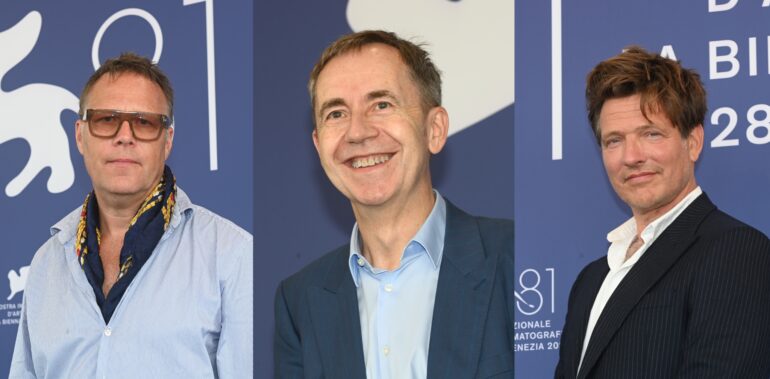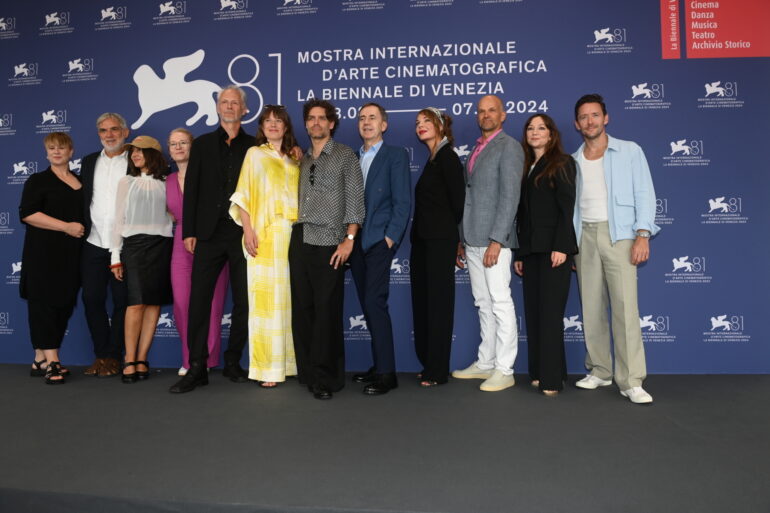WRITTEN BY: Aleksander Huser, Jan Lumholdt
Although being the only Nordic film in the main competition, Norwegian auteur Dag Johan Haugerud’s Love was far from alone in representing the Nordics at this year’s Venice Film Festival.
Norwegian writer/director Dag Johan Haugerud represented the Nordics in this year’s main competition at the Venice International Film Festival with Love (Kjærlighet), the third film in his trilogy Sex Dreams Love (Sex Drømmer Kjærlighet). With the first instalment Sex premiering in the Panorama section at the Berlinale and receiving a Nordic Council Film Prize 2024 nomination earlier this year, the three films are stand-alone, yet interconnected features. Not least by sharing the themes named in the titles, which each film approaches from different angles and through different characters, as well as portraying different parts of Oslo.
The ensemble film stars Andrea Bræin Hovig and Tayo Cittadella Jacobsen as its two most central characters, depicting various and unconventional aspects of love, such as not committing to a steady relationship and the intimacy of casual encounters, with the filmmaker’s signature combination of tenderness, lightness and depth. Love, as well as the whole trilogy, is produced by Yngve Sæther and Hege Hauff Hvattum for Norwegian production house Motlys. The trilogy is supported by the Fund.
Love did not end up with any prizes from the international jury, chaired by French actress Isabelle Huppert, at the awards ceremony and closing of the 81st Venice International Film Festival on September 7. Being the first Norwegian film in Venice’s main competition in almost four decades – since Oddvar Einarson’s raw and daring street drama from Oslo’s alternative art and music scene, X, won the Special Jury Award in 1986 – it should nonetheless be regarded as a historic triumph in itself. Furthermore, Haugerud and the rest of the Love team did not leave the festival completely empty-handed, as the film received the parallel, independent critics’ prize Bisato d`Oro on the day before the main awards ceremony.
In addition, a key contributor from the same Nordic country to one of the main award-winning films deserves to be highlighted. The Silver Lion Award for Best Director went to Brady Corbet for his epic, ambitious and unconventional historical drama The Brutalist, starring Adrien Brody as a visionary Hungarian architect emigrating to the USA with his wife in the aftermath of World War II. Although the US/UK/Hungarian film is admittedly not a Nordic co-production, The Brutalist’s screenplay is written by Corbet together with his Norwegian partner Mona Fastvold. Also a director herself, Fastvold’s American feature The World to Come competed for the Golden Lion in 2020, and was awarded the Queer Lion Award.
An Argentinean competition entry, Luis Ortega’s Kill the Jockey (El Jockey), got a special mention from the CinemaSarà 2024 Collateral Award jury, and won the The Edipo Re Inclusion and Sustainability Award, highlighting a special wish for the survival of expressive freedom in today’s Argentina. The film is co-produced with Mexico, Spain, USA and Denmark via Katrin Pors and Snowglobe.
Additionally, the refugee chamber play Quiet Life, entered in the Orizzonti section, received The Interfilm Award for Promoting Interreligious Dialogue, given out by the International Interchurch Film Organisation, supporting “films which empower understanding, respect, sympathy and peace between people of different origins, histories and beliefs in place of conflict, violence, and suppression”. Directed by Greece’s Alexandros Avranas, this multi-international production is a joint venture by France, Germany, Sweden, Greece, Estonia and Finland, with Sweden’s Fox in the Snow Films with producers Olivier Guerpillon and Frida Hallberg and Finland’s Making Movies with producer Kaarle Ahoparticipating. Somewhat fittingly to its subject, the film doesn’t have one designated nationality. In Quiet Life, Avramos goes deep down into the condition known as Child Resignation Syndrome, a state of apathy affecting child refugees that became a significant media topic in Sweden in the mid-2000s. Sweden is also the main location of the film, following a Russian family seeking, and risking losing, asylum. The international cast includes Nordic actors Lena Endre, Anna Bjelkerud, Alicia Eriksson, Johannes Kuhnke, Lisa Loven Kongsli and Sofia Pekkari.
Closing the Giornate Degli Autori section, also known as Venice Days, Italian writer/director Isabella Torre’s debut feature Basileia was screened out of competition. This atmospheric supernatural thriller tells the story of an archaeologist, played by Danish actor Elliott Crosset Hove, searching for an ancient treasure in the Italian mountains of Aspromonte – with the unforeseen consequence of summoning the mythical female beings known as nymphs. The Italian/Swedish/Danish film is co-produced by Danish production company Snowglobe and Sweden’s Film i Väst.
Denmark’s Thomas Vinterberg premiered his debut TV series Families Like Ours (Familier som vores), a highly eventful seven-episode epic about a near future (parallel present?) Denmark, having to be evacuated due to rising sea levels and rendering its entire population home- and stateless. The main producers of the NFTVF-supported series are Zentropa with TV 2 Denmark.
From Sweden, Göran Hugo Olsson and his production company Story world-premiered the meticulously scrutinising Israel Palestine on Swedish Television 1958–1989 (Israel Palestina på svensk TV 1958-1989). This 206-minute exposé on the Swedish TV coverage of the Israel-Palestine situation spans over the four decades when Swedish TV and radio media was under state monopoly. Ambitions were very high, and absolute objectivity a constant aim. The Venice premiere was followed by an animated Q&A session in which an international group of critics as well as filmmakers often were in both surprise and admiration over this material, hitherto largely unseen outside of Sweden. Further festival screenings for Olsson’s film are confirmed for Busan and London in October, and an expanded six-hour TV version film is set to air early next year. The documentary received top-financing from NFTVF.
Summing up the main Nordic participation at the 81st International Venice Film Festival, it more or less follows previous statistics: fairly few but strong titles, and a modest (when at all) representation in the main competition. Through the years and decades, Venice remains a stronghold for the Southern European “Catholic” cinema rather than the Northern “Protestant” one. Exceptions are made for the maverick auteurs; a Carl Th. Dreyer, an Ingmar Bergman, a Lars von Trier, a Roy Andersson. And this year, as he’s increasingly hailed as such, Dag Johan Haugerud. Welcome to the club, Norway.
To see the Fund's previous article on the festival’s line-up for a complete overview of all Nordic productions at the 81st Venice International Film Festival: CLICK HERE.

